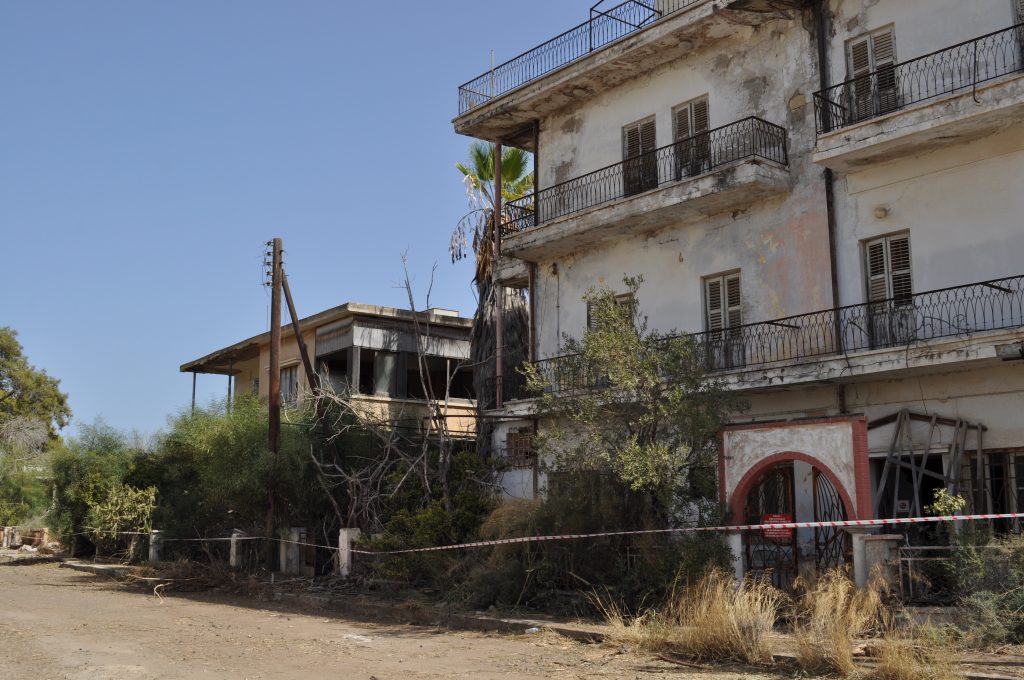The Immovable Property Commission (IPC) has ruled that the Evkaf Administration of Cyprus (Evkaf) can become a party in a case involving property in the abandoned town of Varosha / Maraş, in Famagusta, Cyprus. The case has far-reaching implications for hundreds of cases involving Greek Cypriot claimants.
The IPC ruling marks the first time litigation was needed for Evkaf to become a party to a case before the arbitration body.
The Greek Cypriot claimant had refused to allow the application of Evkaf, a 450-year-old Turkish Muslim philanthropic foundation, to join as an Interested Party, but their objections were overruled by the IPC .
Professor İbrahim Benter, the General Director of Evkaf, welcomed the decision in a statement released earlier today. Responding to the IPC’s announcement on Friday, 28 January, Prof. Benter said:
“We welcome this important, reasoned decision by the Immovable Property Commission to recognise Evkaf’s interest in the case and to allow us to join as a party. We view this as a vital step in protecting our historic property rights in Varosha.”
IPC has resolved nearly 1,300 property cases
The IPC was established in March 2006 in accordance with rulings from the European Court of Human Rights (ECHR) to offer a local remedy to Greek Cypriot owners of land in North Cyprus prior to Turkey’s intervention on 20 July 1974.
A third of Greek Cypriots were displaced by the Cyprus Conflict and their abandoned property seized by the Turkish Cypriot authorities and redistributed to their own refugees after 1974.
In the absence of a comprehensive settlement, Greek Cypriot refugees took their property claims to court. Over 1,500 people lodged cases at the ECHR.
As it was not feasible for the ECHR to hear all these cases, as part of its ruling in the 2005 case of Xenides-Arestis v. Turkey, it instead ordered that an ‘effective domestic remedy’ be formed in Cyprus to hear claims relating to abandoned properties in Northern Cyprus.
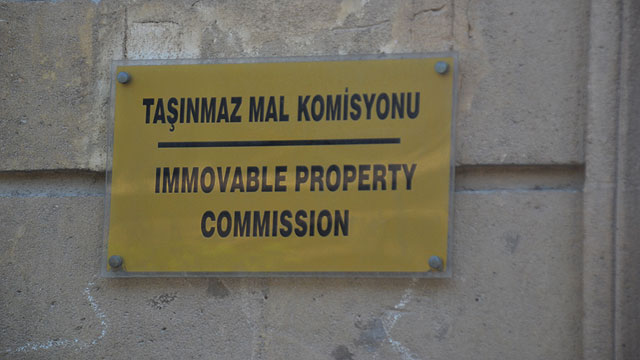
Located in the capital of the Turkish Republic of North Cyprus (TRNC), the IPC has the power to order compensation for the loss of use of an abandoned property, for its restitution (return to the original owner), or to have it exchanged for another. The remedy can also be a mix of all three.
According to a statement on the internationally recognised body’s website, “As of 31 January 2022, 7,071 applications have been lodged with the [Immovable Property] Commission and 1,284 of them have been concluded through friendly settlements and 34 through formal hearing.
“The Commission has awarded GBP 329,949,257 to the applicants as compensation. Moreover, it has ruled for exchange and compensation in two cases, for restitution in three cases and for restitution and compensation in seven cases. In one case it has delivered a decision for restitution after the settlement of Cyprus Issue, and in one case it has ruled for partial restitution.”
Unanimous decision for Evkaf to become ‘Interested Party’
In 2020, Evkaf submitted an application to the IPC on behalf of the Abdullah Pasha Vakıf, which it administers, to join case 1732/2011 as an Interested Party. However, the Greek Cypriot plaintiff objected to Evkaf’s involvement, resulting in litigation. Evkaf was represented by lawyers Ergin Ulunay, Kemal Mut and Yusuf Ergüçlü.
After hearing the arguments for and against, the IPC agreed that Evkaf has legitimate grounds to join the case and its application was approved unanimously.
It was the first time litigation was needed by Evkaf to be admitted to an IPC case involving a Greek Cypriot property claim in North Cyprus. Previously, the charitable foundation has joined such cases with the consent of the plaintiff.
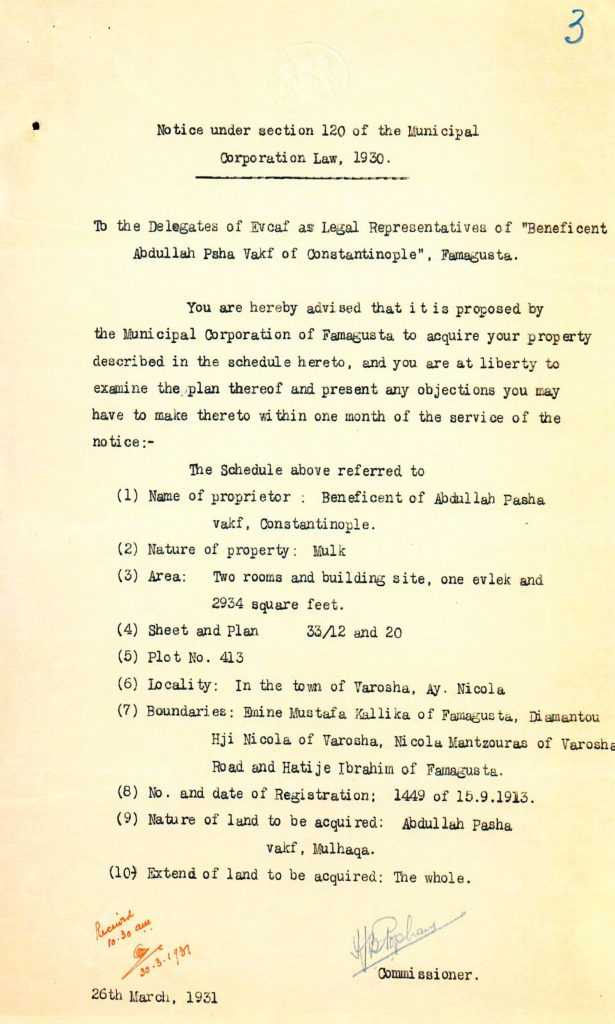
Varosha was partially opened by the TRNC Government in October 2020. President Ersin Tatar, then Prime Minister, is an ardent believer that the decaying sea side resort serves no purpose closed and that it should be returned to its former owners – with or without a settlement of the Cyprus Dispute.
President Nicos Anastasiades has slammed the opening of Varosha by the Turkish Cypriot side and demanded that the town is administered as set out in UN Resolutions 550 and 789. His government has also urged Greek Cypriots with assets in Varosha not to apply to the IPC, but to instead wait for a settlement of the decades-old Cyprus Dispute.
That call has not been heeded. To date, over three hundred Greek Cypriots have made applications for their properties in the fenced-off town to be returned to them and to be compensated for their lack of use.
The decision by the IPC to admit Evkaf as an Interested Party could form an important precedent in other cases involving property disputes in Varosha where Greek Cypriots object to Evkaf’s involvement.
That prospect has fuelled anger in the South of the island. The Greek Cypriot authorities have routinely dismissed both the historic rights of Evkaf in Varosha and the validity of the IPC.
IPC a “trap” says Greek Cypriot leader
On Saturday, President Nicos Anastasiades called the IPC decision “a trap”: “The decision to name Evkaf an interested party in the fenced-off areas of Famagusta confirms that this was indeed a trap,” the Greek Cypriot leader said.
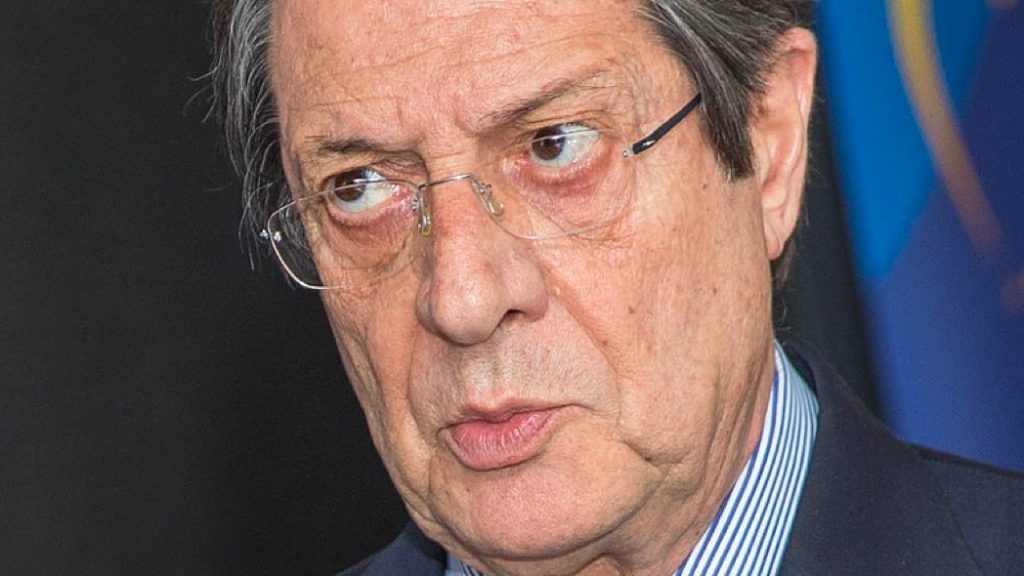
Also weighing into the debate was Famagusta Mayor Simos Ioannou who claimed the IPC was a “Trojan horse” by which “Turkey has set a trap for looting property and rights through legal procedures.”
Both men side-stepped the fact the IPC had been set up to assist Greek Cypriot refugees desperate to recover their property assets and to be compensated for their losses, for which the Greek Cypriot government offers no permanent alternative remedy.
The validity of the IPC has been tested in court before and each time the ECHR has upheld the body, whose adjudicating members include non-Turkish Cypriots, as offering an effective remedy and whose decisions are fair and in accordance with international laws.
One of the most far-reaching cases about the IPC was that of Demopoulos and Others v. Turkey. The ECHR ruled in March 2010 that Greek Cypriot refugees can only apply to Europe’s top human rights court for property justice after they have exhausted all domestic remedies in North Cyprus, including applying to the IPC.
The landmark case also ruled that existing occupants of abandoned refugee properties have rights and there is no longer an automatic right of return for refugees to their former properties in the TRNC. The ECHR stated in its ruling that it was ‘not right to create a new injustice to remedy an old one’.
Evkaf rights in Varosha and the theft of its property
Evkaf maintains it is the legal owner of 100% of the land in Varosha, situated on the eastern coast of Cyprus, and that its property was unlawfully transferred to individuals and organisations when Cyprus was under British colonial rule. The UK had leased the island from the Ottomans in 1878 and seized control during the First World War, with Cyprus remaining a British colony until it was granted independence in 1960.
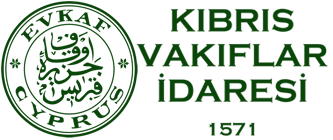 According to the laws and international treaties governing Evkaf, to which Britain is also a signatory, Evkaf assets cannot be sold or transferred.
According to the laws and international treaties governing Evkaf, to which Britain is also a signatory, Evkaf assets cannot be sold or transferred.
Currently celebrating its 450th year, Evkaf upholds the important Turkish and Muslim tradition of charity and kindness.
The philanthropic foundation is one of Cyprus’ oldest institutions and was established by order of Sultan Selim II in 1571, after the Ottomans conquered the island. Its remit is to oversee Muslim charitable donations and works for the benefit of all of Cypriot citizens regardless of their ethnicity, religion, gender, or language.
Headquartered in Lefkoşa, the organisation administers over 2,200 trusts. Its purpose since 1571 has remained the same, to use its income to serve the diverse people of Cyprus with charitable deeds in education, healthcare, aiding the poor, protecting the environment, animal welfare, and maintaining religious sites and burial grounds for people of all faiths.
Muslims in Cyprus traditionally bequeathed land or money to Evkaf or formed a trust (Vakıf) in their name and asked Evkaf to administer it. One such trust is the Abdullah Pasha Vakıf.
Abdullah Pasha Vakıf is one the three big landowners in Varosha, the other two being the Mustafa Paşa Vakıf and the Bilal Ağa Vakıf.
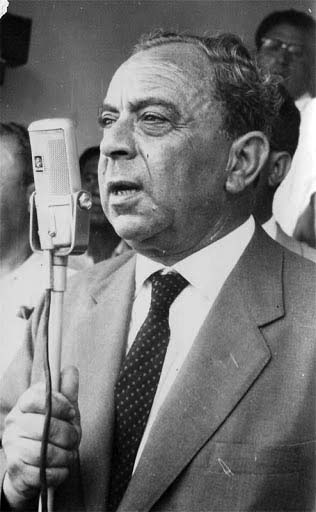
Historically, rental income from Abdullah Pasha Vakıf’s Varosha estate was used to fund a wide range of charitable needs, including local teachers’ salaries, schooling and clothing for local children, health care, aid for widows and orphans, dowries for young women from poor families, and the repair and maintenance of mosques.
These vital aids and charitable works came to an abrupt stop when the British transferred – unlawfully Evkaf claims – title deeds to the land to Greek Cypriots.
Evkaf has spent years carefully compiling all the evidence of the theft of its property. This ongoing work involves a dedicated team researching Ottoman, British and Republic of Cyprus archives to locate all the deeds and other proofs relating to Evkaf’s extensive property assets across the entire island. At its peak, Evkaf owned approximately 30% of all private land in Cyprus.
In 1940, Turkish Cypriot leader Dr Fazıl Küçük launched a major campaign to wrest control of Evkaf back from the British, but by the time he achieved that, some sixteen years later, the damage had been done.
The charitable foundation had been stripped of nearly all of its assets and due to the conflict on the island, first during the Cyprus Emergency of 1956 to 1959, and then the decade-long Cyprus Conflict, the theft of Evkaf property has never been fully addressed.
Main image, top, of Varosha, TRNC, show dilapidated private buildings marked ‘off limits’ on opening day of ghost town, 08 Oct. 2020. Photo © Selim Kumbaraci / Pasadembo


